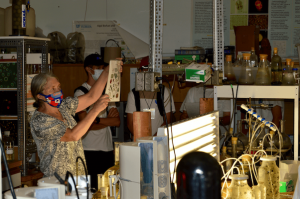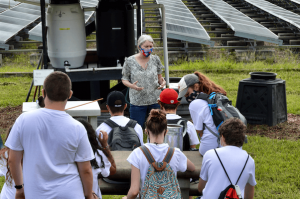Dr. Ann Wilkie with the UF/IFAS soil and water sciences department hosted nearly 40 high school students participating in the “Save Earth’s Environment through Knowledge” program (SEEK). The Florida Federation of Garden Clubs (FFGC) organizes the SEEK program, which began in 1970. Former students are environmental engineers, researchers, directors of environmental charter schools, and science teachers. Some recent participants returned to help run the program.
“Our goal is to build on the students’ interest by presenting environmental fields that will move them forward to an environmental career,” explained Mary Whisler with FFGC. “Hopefully, we will have a small part in getting our next generation educated in protecting our state and country.”
The students from across Florida take part in the SEEK program on the recommendations of their science teachers and because of their interest in environmental issues. Wilkie, a research professor of bioenergy and sustainable technology encouraged them to study soil and water sciences – the foundation of all life on Earth. Then she discussed one focus of her work – cultivating algae for carbon capture and utilization.
The group learned that the growth rate of algae greatly exceeds that of other photosynthetic organisms and cultivation of algae has significant potential to capture carbon dioxide and reduce greenhouse gas emissions. They also heard how photosynthetic algae have exceptional potential for remediating waste resources and transforming solar energy into vital carbon-based resources, including foods, fibers, feeds, fertilizers, pharmaceuticals, and biofuels. “Utilizing waste resources abates environmental burdens and eliminates the need for adding synthetic nutrients in the algal culturing medium,” Wilkie explained.
“Algae are an important part of the carbon cycle because they absorb carbon dioxide from the atmosphere and help reduce global warming,” Wilkie said. “We had a good discussion, which I hope started the students thinking about climate change and alternatives to fossil fuels.”
In addition to her lab, Wilkie and her student, Laura Valletti, gave the group a tour of the UF Student Compost Cooperative (SCC). Wilkie is director of the cooperative, which encourages the UF community – and Gainesville residents – to bring their food scraps to turn them into nutrient-rich compost to reduce food waste and greenhouse gas emissions. The composting process was explained to the group and they viewed the garden plots where students use the compost and grow their own food and herbs.
Wilkie highlighted the areas of classes and research that the soil and water sciences department offers. That includes water quality, soil health, climate change, and nutrient management.
“We need the younger generation to start solving the environmental problems facing our world,” Wilkie said. “A student who earns a degree in soil and water sciences can work in jobs at all levels of government as well as the private sector, and those skills will translate into any part of the world.”
GROWING ALGAE
ALGAE IN THE LAB
STUDENT COMPOST COOPERATIVE
 1
1














